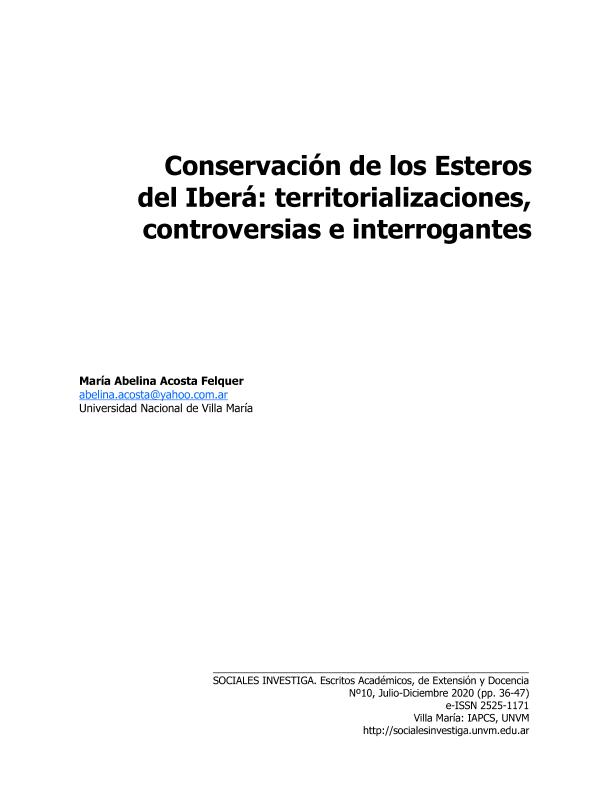Mostrar el registro sencillo del ítem
dc.contributor.author
Acosta Felquer, María Abelina

dc.date.available
2022-09-22T17:43:20Z
dc.date.issued
2021-12
dc.identifier.citation
Acosta Felquer, María Abelina; Conservación de los Esteros del Iberá: Territorializaciones, controversias e interrogantes; Universidad Nacional Villa María. Instituto Académico Pedagógico de Ciencias Sociales; Sociales Investiga; 10; 12-2021; 36-47
dc.identifier.uri
http://hdl.handle.net/11336/170034
dc.description.abstract
Los Esteros del Iberá constituyen un humedal que se ha convertido en un territorio en el que se conjugan diversos intereses que cristalizan la valorización y apropiación de bienes comunes y sus consecuentes tensiones. Estas se visibilizan a través de la privatización de miles de hectáreas de tierras destinadas a la producción de arroz y explotación forestal y de la creación de distintas áreas de conservación y los emprendimientos ecoturísticos que se desarrollan alrededor de las mismas.El objetivo de este artículo es proponer interrogantes en torno a aquellos problemas que articulen ambiente, sociedad y conocimiento, y que han derivado o pueden derivar en conflictos socioambientales en el Norte, Sudeste y Oeste de dicho humedal. Asimismo, intentamos desarrollar breves reflexiones que se desprenden de dos interrogantes que creemos centrales que apuntan a la heterogeneidad y a la territorialización simbólica.Los conflictos socioambientales dejan en evidencia la tensión causada por la multiplicidad de conocimientos, intereses y relaciones sociales con el espacio, pues en palabras de Porto-Gonçalves (2015), en las relaciones nosotros inventamos los territorios. Y estos a su vez, están cargados de poder, historicidad y simbolismos.
dc.description.abstract
The Esteros del Iberá (Iberá Wetlands) constitute a wetland that has become a territory in which diverse interests come together to crystallize the valorization and appropriation of common goods and their resulting tensions. These are made visible through the privatization of thousands of hectares of land for rice production and forestry exploitation, and the creation of different conservation areas and the ecotourist enterprises developed around them. The objective of this article is to pose questions regarding those problems that articulate environment, society, and knowledge, and that have derived or may derive in socioenvironmental conflicts in the North, Southeast and West of the wetland. Likewise, we try to develop brief reflections arising from two questions that we believe to be central, which point to heterogeneity and symbolic territorialization. Socio-environmental conflicts leave in evidence the tension caused by the multiplicity of knowledge, interests and social relations with space, because in the words of PortoGonçalves (2015), in the relations we invent the territories. And these, in turn, are loaded with power, historicity and symbolism.
dc.format
application/pdf
dc.language.iso
spa
dc.publisher
Universidad Nacional Villa María. Instituto Académico Pedagógico de Ciencias Sociales
dc.rights
info:eu-repo/semantics/openAccess
dc.rights.uri
https://creativecommons.org/licenses/by/2.5/ar/
dc.subject
TERRITORIALIZACIÓN
dc.subject
CONSERVACIÓN
dc.subject
ACTORES SOCIALES
dc.subject
CONFLICTOS
dc.subject.classification
Ciencias Sociales Interdisciplinarias

dc.subject.classification
Otras Ciencias Sociales

dc.subject.classification
CIENCIAS SOCIALES

dc.title
Conservación de los Esteros del Iberá: Territorializaciones, controversias e interrogantes
dc.type
info:eu-repo/semantics/article
dc.type
info:ar-repo/semantics/artículo
dc.type
info:eu-repo/semantics/publishedVersion
dc.date.updated
2022-09-22T15:00:00Z
dc.identifier.eissn
2525-1171
dc.journal.number
10
dc.journal.pagination
36-47
dc.journal.pais
Argentina

dc.journal.ciudad
Villa María
dc.description.fil
Fil: Acosta Felquer, María Abelina. Consejo Nacional de Investigaciones Científicas y Técnicas; Argentina. Universidad Nacional de la Matanza. Departamento de Derecho y Ciencia Politica; Argentina. Universidad Nacional de Villa María; Argentina
dc.journal.title
Sociales Investiga
dc.relation.alternativeid
info:eu-repo/semantics/altIdentifier/url/https://socialesinvestiga.unvm.edu.ar/ojs/index.php/socialesinvestiga/article/view/366
Archivos asociados
